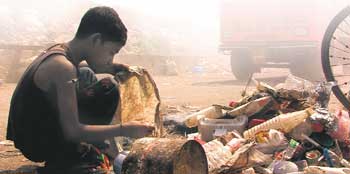New Orleans Ok, how many times will I ever get to blow this horn – not many probably, so…hey, the ACORN Foundation documentary done by our friend, Parasher has been invited to be shown in the prestigious Munich Film Festival this summer on a special invitation. How about that! The real “slumdogs” are having a day in the sun in Germany.
Here are two articles celebrating the invitation that ran in Mumbai in recent days.
www.mumbaimirror.com/index.aspx
Twin Success
Films on “real life slumdogs” and the Naga struggle by city documentary filmmaker Parasher Baruah to be screened in Munich and Switzerland respectively
By Lekha Menon
Posted On Thursday, May 07, 2009
he camera follows Santosh, Sameer and Salman closely as they navigate through mountains of rubbish to pick up bottles, metal or any other material that can fetch them their next meal.
They talk about their aspirations and fears even as they scavenge the swamp for more “treasures”. The trio are among the thousands of child rag pickers of Mumbai — a silent workforce living on the fringes, yet a group that makes a vital contribution to the city’s recycling industry.
The boys’ story might be of little interest to mainstream society, but now their voices will be heard on a global stage thanks to Waste, a film by documentary filmmaker Parasher Baruah, that will be screened at the 24th International Documentary Film Festival (also called DOK.FEST) in Munich, later this week. Considered one of Germany’s biggest film festivals for documentaries, Waste will be screened in the competitive Horizons section.
(Top) A still from Waste and
(Above) Parasher Baruah is thrilled with the response
to his film
But Baruah, who has shot several Assamese short films and documentaries over the last decade, is happier about the message getting across at an international level. “Society rarely recognises the efforts of rag pickers. They work without any protection in hazardous conditions, but for them waste is gold. And with the current redevelopment plan, they stand to lose their income,” he says.
Baruah embarked on the documentary last year when Acorn India Foundation, an NGO working with rag pickers of Dharavi, decided to produce a film on the subject as part of their multi-media project. He then won the Infochange Media Fellowship to make the film and soon he was out in the swamps of Deonar filming the boys at work.
However, for all the accolades his film is getting, Baruah regrets that the ‘slumdog’ effect shadows his work as well.. “That my film is based in Dharavi is a coincidence, but the western media has already dubbed it as the story of three “real life slumdogs”. That was bound to happen, I guess,” he shrugs.
Nevertheless, the filmmaker has another reason to cheer. Another film of his, When the soul of a nation dies, based on a poem written by Naga writer Easterine Iralu will be screened on May 17 at the Museum de Kulteren Basel, Switzerland, as part of their ongoing exhibition on Nagaland. An experimental poem-film that talks about the Naga struggle, Iralu’s poetry is used as soundtrack to convey the message. “I had shot this film last year on a trip to Nagaland with the help of locals who acted as crew members. A few months ago, it was screened at the Tromse International Film Festival, Norway. But the screening in Switzerland has come as a pleasant surprise,” says Baruah.
www.hindustantimes.com/StoryPage/StoryPage.aspx
Naomi Canton, Hindustan Times
Mumbai, May 07, 2009
First Published: 02:13 IST(7/5/2009)
Last Updated: 02:16 IST(7/5/2009)
Santosh Mohite has been a ragpicker for two years.The 17-year-old who left school at the age of seven lives under a sheet on the pavement next to an open garbage dump in Mahim.
He earns Rs 100 per day wandering around illegal dumps and swamps, searching for plastic, copper, metal and bottles which he sells to recyclers.
His life and that of two other teenage ragpickers of Dharavi have been featured in a documentary Waste, which has been selected for screening at the International Documentary Film Festival in Munich.
The 37-minute film was made by Kandivli resident Parasher Baruah (32), a graduate of Pune’s Film and Television Institute of India.
He shot it over three months on a budget of Rs 50,000 after winning a fellowship from www.infochangeindia.org, an organisation that promotes social causes.
“You find ragpickers in every square yard of the city. They are often migrants, mostly pavement dwellers, with a few bundles of clothes and utensils,” Baruah said. “And yet they unknowingly contribute to the process of recycling. They don’t like the work but at the same time it pays to feed them.”
The BMC had just started developing green waste policies, but the unorganised sector had been doing it for years, he said. “At the very least they (ragpicker) would like to be given gloves and boots.”
Sitting in his makeshift tent, Mohite said, “The work is okay but when I grow up I would like to work in a company.” He said he did not think the film would make a difference to his life.
In the dump behind their home, sitting on a pile of old film reels, radio sets, wrappers and plastic, Alihaasan Khan (55) was picking out quality plastic. “I like my job,” he said.
He claimed he earned more than Rs 300 per day. Private trucks lined up outside bring trash from scrap dealers for people like him to sift through.
